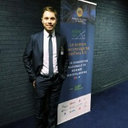About
12
Publications
2,453
Reads
How we measure 'reads'
A 'read' is counted each time someone views a publication summary (such as the title, abstract, and list of authors), clicks on a figure, or views or downloads the full-text. Learn more
253
Citations
Introduction
Skills and Expertise
Publications
Publications (12)
The production and consumption of textile products worldwide generate severe environmental impacts as well as economic and social repercussions. Companies are embarking on a new path towards sustainable production and consumption patterns to respond to increasingly environmentally conscious consumers. This study aims to investigate the characterist...
Digital transformation (DT) is progressively changing the paradigm of agricultural enterprises. The adoption of new digital technologies such as the Internet of Things (IoT), machine learning, cloud, artificial intelligence, and big data aims, at the first moment, to increase productivity and product quality and reduce environmental impacts. Severa...
Sustainability and the circular economy (CE) are issues of increasing interest to governments, investors, industry, and civil society, and for this reason, the implementation of a business model for circularity and/or sustainability is becoming crucial for achieving and maintaining a competitive advantage for various organizations. In this context,...
Digital transformation (DT) affects companies' competitiveness mainly in terms of innovation, efficiency, and cost reduction and affects global value chains in specialization, geographic scope, governance, and upgrading. In food, digital tools can improve competitive advantage by supporting companies in ensuring food quality and safety. However, ma...
Purpose
This work aims to assess the potential of a Bio-District as a model for applying the circular economy concerning the waste scope. It aims to understand the capability of organic farms to manage waste with a circular perspective, starting with the use of indicators that directly or indirectly impact the waste scope.
Design/methodology/appro...
Sustainability and the circular economy (CE) are issues of increasing interest to governments, investors, industry, and civil society; for this reason, the implementation of a business model for circularity and/or sustainability is becoming crucial for achieving and maintaining a competitive advantage for various organizations. In this context, con...
PurposeThe transition to a circular agri-food sector is a necessary condition for the sustainable development of the current production and consumption model. The complexity of the agri-food chain requires the introduction of a harmonized measurement system so that the circular economy can be applied. This study aims to define a life cycle-based da...
Adopting circular economy principles in the agri‐food sector is necessary for the conversion of the current economic system. However, there are still many gaps in understanding how the development of circular dynamics within companies can take shape. This study investigates how circular economy principles and factors contribute to value optimisatio...
The agri-food sector is one of the key sectors where the action is needed to ensure the transition to a more sustainable development model in line with the principles of the circular economy (CE). The use of indicators to monitor progress and areas for action is a key element in the shift of companies, regions, and countries toward a circular model...
The transition of the European agri-food sector towards a sustainable production and
consumption model is a key element of the Green Deal. The new European “Farm to Fork” strategy aims to make the food system fair, healthy, and environmentally friendly. The consolidation and development of the organic model are two of the main objectives. In Italy,...
Sustainable tourism can be the motivation to manage resources to satisfy environmental, social and economic needs through cultural integrity, biological diversity, ecological processes, social and economic equity, and general enrichment. Based on a systematic literature review conducted on research papers published between 2015 and 2020, and on the...


























